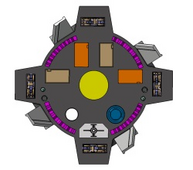The SIROM project aims to develop physical interfaces, which can be used to connect payloads in planetary and orbital applications with manipulators or other payloads, as well as two systems, e.g. client and server. This includes interfaces which can not only establish a physical connection but also serve to transmit electrical energy, data, and heat. The focus is on the development of key technologies for autonomic robotic systems to be used in on-orbit satellite maintenance and assembly work as well as in planetary exploration. In SIROM the Robotics Innovation Center is responsible for the development of a mechanical interface in general and for the definition of requirements in particular as well as for the execution and evaluation of the final experiments.
SIROM is part of the project “PER ASPERA (ad ASTRA)” (Latin meaning “Through hardships to the stars”), which is funded by a grant by the European Union through the Horizon 2020 Programme.
The European Commission has funded, as part of the Horizon 2020 Space Work Programme 2014, a Programme Support Activity (PSA) for the implementation of a Strategic Research Cluster (SRC) on Space Robotics Technologies.
Space Robotics has been identified by European actors as a key technology for improving the competitiveness of the European space sector. The European Commission has set up the “Space Robotics Technologies” Strategic Research Cluster (SRC) in Horizon 2020, with the goal of enabling major advances in strategic key-points of Space Robotics Technologies, in order to improve the European competitiveness. The main objective of the SRC for Space Robotic Technologies is the creation, within the 2020-2030 timeframe, of the necessary tools to ensure and consolidate the maturity of the Space Robotic technologies for orbital maintenance missions and planetary exploration, and contribute to guarantee the leadership of European capabilities in Space Robotics at world level within the 2020-2030 timeframe. These activities will be developed in coherence with the existing and planned developments at national, commercial and ESA level.
The SRC system of grants considers two types of grants: Programme Support Activitiy (PSA) and six Operational Grants (OG1-6). SIROM is Operational Grant Number 5. All OGs works together with PSA.
Partners
SENER, Airbus Defence and Space, Airbus DS GmbH, Thales Alenia Space, Leonardo S.p.A., University of Strathclyde, TELETEL, Space Application Services, MAG SOAR S.L.


